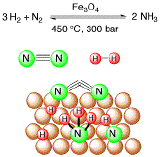(translated by Sean R. Stevens)
 Plants are composed of different carbohydrates, not all of which lend themselves to the production of ethanol. Cellulose, the main component of wood, is, by virtue of its structure, too stabile to be enzymatically or chemically decomposed, and thus not a suitable source material for ethanol production. Starch, the main component of potatoes, corn and other grains, can be enzymatically broken down into malted sugars, though. Finally, sugarcane, beets, and sorghum can be directly converted to ethanol.
Plants are composed of different carbohydrates, not all of which lend themselves to the production of ethanol. Cellulose, the main component of wood, is, by virtue of its structure, too stabile to be enzymatically or chemically decomposed, and thus not a suitable source material for ethanol production. Starch, the main component of potatoes, corn and other grains, can be enzymatically broken down into malted sugars, though. Finally, sugarcane, beets, and sorghum can be directly converted to ethanol.
Fuel production through neutral carbon dioxide means sounds like the perfect solution: carbon dioxide which is taken from the air through the growth of sugar producing plants is eventually released into the environment through the use of ethanol. You can find a large array of problems upon closer inspection, though, which lead to doubts against the climate friendliness of bio-ethanol:
(1) Cellulose, the main component of every plant (stems and leaves) is not easily converted to ethanol. Only the starch content, which is found mainly in the fruit of plants, can be fermented, with the aid of yeast enzymes, and thus converted to ethanol.
(2) Only two-thirds of all sugars are converted into ethanol through enzymatic fermentation; one-third is directly converted into carbon dioxide and released into the atmosphere.
(3) The harvesting, transporting, and refining of crops requires funds measurably greater than that of oil extraction and delivery. In contrast to oil, ethanol is not transportable through pipelines, because water that collects in the pipelines – something that cannot be prevented – mixes with ethanol, making an unusable product. Oil does not mix with water, though, allowing separation in the lab through use of the well known principle of separatory funnelling.
Nevertheless, considering these aspects alone the production of corn based ethanol would be a sensible measure to reduce carbon dioxide emission.
 The Nitrogen Factor
The Nitrogen FactorUnderlying soil must be fertilized in order for crops to grow. Nitrogen based fertilizers have to be used here, which turns out to raise two problems at the same time. The fertilizers must be produced, for one, taking nitrogen from the air that is converted into ammonia through the use of the multiple Noble Prize winning Haber-Bosch process,. This process, which was developed through the last century, and has made the mass production of crops by modern fields possible, requires a tremendous amount of energy, accounting for approximately 1-2% of the world’s energy usage! In order to further develop ground for field use, an even greater use of fertilizer will be necessary, requiring even higher ammonia production.
> > > Part 3: Nitrous oxide - worse than carbon dioxide for the climate!
Pictures
Sugar beet (by Markus Hagenlocher, Wikimedia Commons)
Related Articles
The greenhouse effect from a chemical point of view |